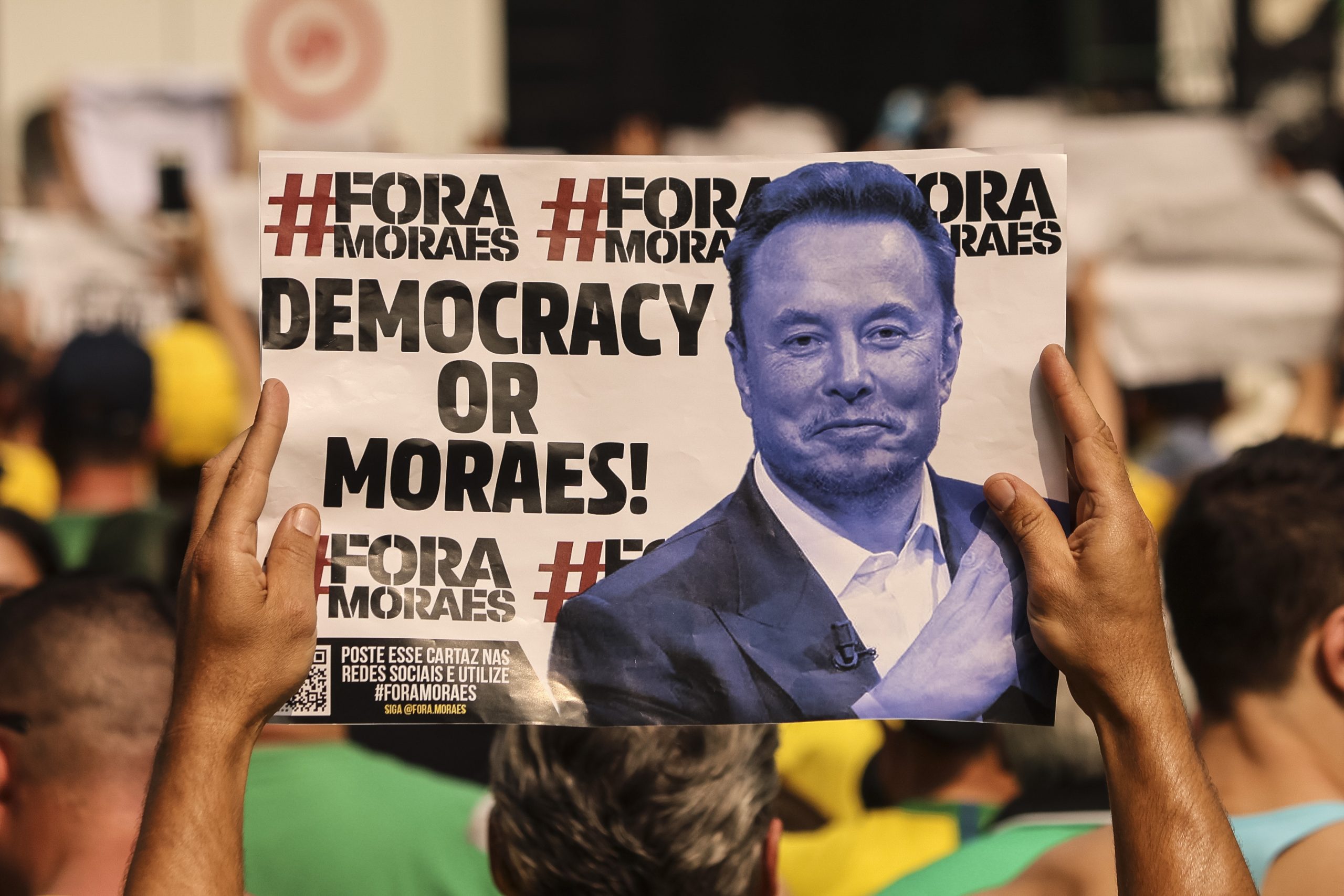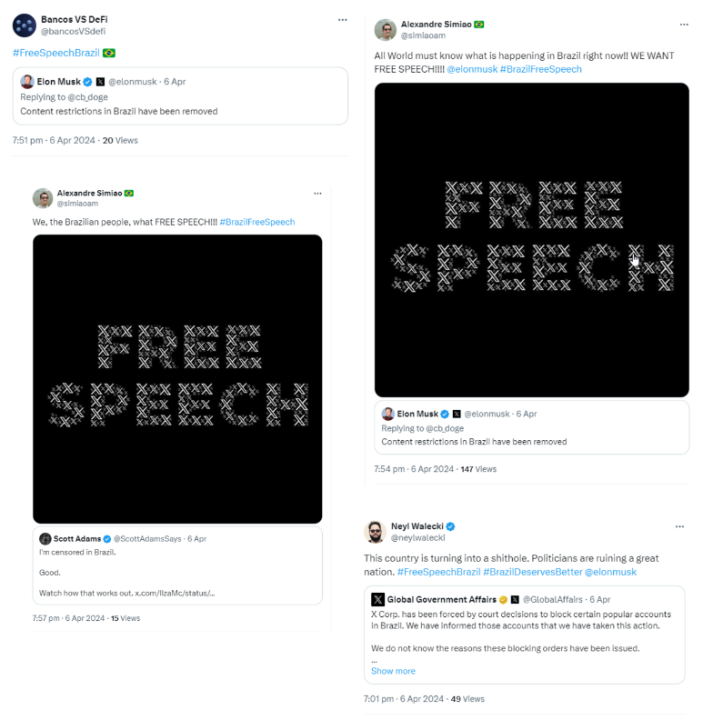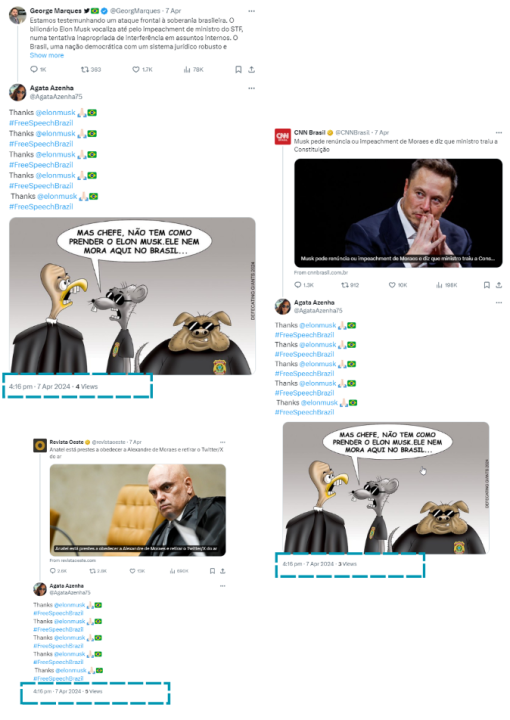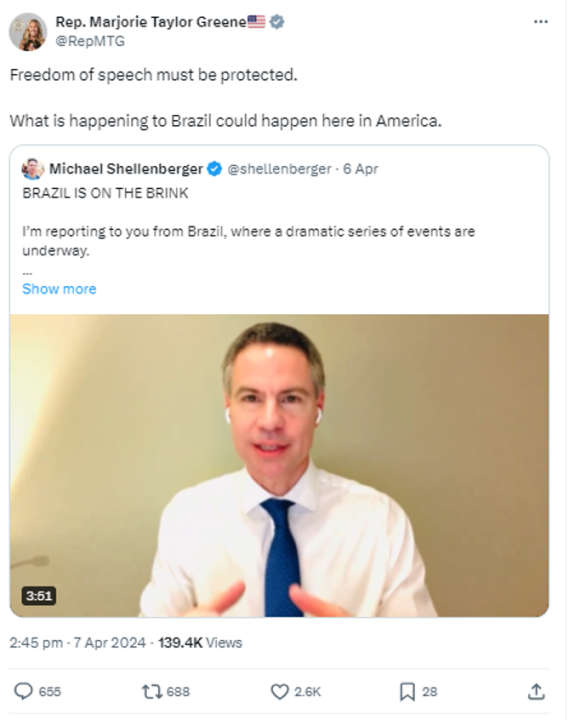Bolsonaro supporters launch X campaign before temporary ban, accusing Brazil of censorship
In April 2024, Bolsonaro supporters targeted international audiences with messages decrying individual account bans as censorship

Banner: Supporters of former President Jair Bolsonaro (PL) participate in an event in São Paulo protesting against Supreme Court Justice Alexandre de Moraes, who had suspended the social network X in Brazil, September 7, 2024. (Source: Fabio Vieira/FotoRua/NurPhoto via Reuters Connect)
Five months before Brazilian Supreme Court Justice Alexandre de Moraes imposed a temporary nationwide ban of the platform X in late August 2024 for failing to comply with court orders, local accounts launched a campaign aimed at international audiences alleging the Brazilian government was dictatorial regime that was suppressing freedom of speech among supporters of former president Jair Bolsonaro. The campaign emerged in April 2024 after X owner Elon Musk accused Brazilian Supreme Court Justice Alexandre de Moraes of censorship in response the court ordering X to ban accounts that it believed were spreading disinformation and hate speech.
Since 2019, government authorities have opened multiple inquiries into content on social media platforms, sparking controversy among jurists and civil society groups. This includes the 2019 fake news inquiry overseen by Moraes, which investigated disinformation produced during Bolsonaro’s administration. In 2020, the Supreme Court ruled that the fake news inquiry and similar investigations were legitimate, stating that the court can open investigations when people commit criminal attacks against the court or its members, or when they pose a threat to the rule of law and democracy.
While the intent of these inquiries was to curb disinformation and antidemocratic acts, jurists, ministers, and politicians have expressed concerns about the concentration of power at the Supreme Court, while civil society organizations have called for transparency and reasonableness in court decisions to protect freedom of expression.
Musk’s decision to weigh in on the controversy helped galvanize Bolsonaro supporters and further disseminate their position that Moraes and the court were engaged in censorship and political persecution in partnership with the administration of leftist President Luiz Inácio Lula da Silva, widely known as Lula.
Meanwhile, several weeks prior to Musk’s remarks, Congressman Eduardo Bolsonaro, Bolsonaro’s son, visited the United States and delivered a series of speeches and interviews to denounce the “dictatorial regime” in Brazil. This included an interview with conservative political commentator Tucker Carlson in which he said that Brazil is no longer a free country, and claimed that people had been arrested and silenced by court inquiries. In another interview with Alec Lace during the Conservative Political Action Conference (CPAC), Eduardo reiterated his belief that authorities were persecuting conservatives and his father’s supporters in Brazil. He compared the situation in Brazil to that of the United States, saying that former president Donald Trump is also a victim of this type of persecution.
Musk vs Moraes
The online campaign began when Musk replied to a tweet from Brazilian Supreme Court Justice Alexandre de Moraes by asking, “Why are you demanding so much censorship in Brazil?” Musk’s reply was in response to three-month post in which Moraes congratulated former Supreme Court Justice Ricardo Lewandowski for his new role as Minister of Justice and Public Security of Brazil.

Musk’s allegations of censorship was an indirect reference to court orders taken by the Supreme Court since 2020, especially by Moraes, mostly to block posts or ban users that he and the court deemed were engaged in anti-democratic activity.
Moraes is currently involved in different inquiries, the most famous being the digital militias inquiry, which is investigating allegations of pro-Bolsonaro politicians and influencers using social media accounts in a coordinated way to disseminate and incite anti-democratic acts, and the inquiry into the January 2023 attack by Bolsonaro supporters on the Brazilian Congress, the Supreme Court building, and the Presidential Palace.
Despite the banning orders being confidential, accounts belonging to several Bolsonaro allies and conservative personalities who support the far right have been suspended from X over the years, including Brazilian politician Daniel Silveira, jailed for posting offenses and threats to the court; blogger Allan dos Santos, investigated for the publication of disinformation and endorsement of an unconstitutional political agenda; and the Brazilian influencer Rodrigo Constantino, investigated for disseminating hate speech and anti-democratic narratives. The total number of court orders issued to X remains in dispute, however, as there is no public information regarding these orders. This makes it difficult to hold the court accountable for any potential instances of its orders exceeding its constitutional mandate.
On April 6, X announced its refusal to comply with the court’s orders and promised to reinstate all restrictions imposed on Brazilian X profiles by the court orders. The platform tweeted that it does “not know the reasons these blocking orders have been issued” and “which posts are alleged to violate the law.” It continued, “We are prohibited from saying which court or judge issued the order, or on what grounds. We are prohibited from saying which accounts are impacted. We are threatened with daily fines if we fail to comply.”
Immediately following these developments, Moraes added Musk to the digital militia inquiry, alleging that Musk had “started a disinformation campaign” against the Supreme Court and the Electoral Court and “incited disobedience and obstruction” of justice.
On August 16, Moraes summoned X’s legal representative in Brazil, Rachel de Oliveira Villa Nova Conceição, for X’s failure to comply with court orders. The following day, X announced that it had decided to close its office and operations in Brazil “to protect the safety” of its team.
Moraes then ordered X on August 28 to appoint a new legal representative in Brazil within 24 hours, under penalty of immediate suspension from the country. On August 30, Moraes ordered X to be taken offline as the requirement was unmet, imposing a ban on X via mobile and internet operators and app stores. The Supreme Court justices relied on the Brazilian Civil Rights Framework for the Internet, which states that all tech companies must have a legal representative in the country. The ban remained in place until October 8, when the court announced that X had fulfilled its obligations to by imposing the restrictions demanded within the court orders. The following day, the Brazilian news outlet UOL reported that X had removed 223 accounts at the request of Brazilian authorities, with 158 of them removed under Supreme Court order.
The #FreeSpeechBrazil campaign
The April 2024 campaign on X used #FreeSpeechBrazil as its primary hashtag. Adopting a phrase in English rather than Portuguese suggests that the campaign intended to reach a global audience and encourage engagement from aligned ideological influencers around the world. The DFRLab identified a limited number of examples of notable figures outside Brazil engaging with messages consistent with the campaign’s narratives, which accounted for 6 percent of total engagement with the hashtag.
Using the social media analytics tool Meltwater Explore, the DFRLab identified 219,000 mentions of the hashtag #FreeSpeechBrazil on X between April 4 and April 11, 2024. This count includes variations like #FreeSpeechBrasil and #BrazilFreeSpeech, as well as related hashtags such as #CensuraNao (“No Censorship”) and #oXnaopodecair (“X can’t go offline”).

The largest number of mentions came from reposts (66 percent) and replies (24 percent). According to a Meltwater Explore query, only 3.7 percent of mentions came from original posts. The other six percent came from quote-tweets.
The accounts @neylwalecki, @bancosVSdefi, and @simiaoam were the first to post the hashtags #FreeSpeechBrazil, #FreeSpeechBrasil, and #BrazilFreeSpeech respectively, according to a Meltwater Explore query. The tweets were published between 7:01 PM and 7:57 PM local time on April 6. The tweets respectively quote-tweeted a statement from X’s Global Government Affairs account, indicating that the company was forced by a court order to block accounts in Brazil; a post written by Musk announcing that X removed content restrictions; and a post by cartoonist Scott Raymond indicating his account on the platform Locals was blocked in Brazil. Tweets by @simiaoam also contained an image in which the phrase “Free Speech” was written using letters comprised of stacked X logos.

The #FreeSpeechBrazil campaign peaked on April 7, the day after Musk replied to Moraes, with 107,252 mentions and 42,156 accounts that engaged with the campaign that day. Via Meltwater Explore, the DFRLab found evidence of a concentrated number of accounts employing a hyper-posting strategy to amplify the narrative and manipulate traffic. Overall, 36,000 accounts posted campaign-related hashtags one to three times; in contrast, twenty-six accounts used the hashtags more than 100 times each, while seven accounts posted them more than 200 times.
The most active accounts on April 7 were @paulotequila23 (which posted the hashtags 254 times), @vanderleivca27 (244), @agataazenha75 (234), @joaopaulo136454 (224), @alexandreortig1 (212), and @jackelineleite8 (208). All the accounts have expressed support for Bolsonaro, whether in their bios or previously published content.
The accounts all used the same tactics to promote the hashtag, either reposting content or mentioning the campaign hashtags when replying to posts made by other accounts, including pro-Lula accounts, mainstream media, or other pro-Bolsonaro accounts.
The account @agataazenha75 posted the hashtag #FreeSpeechBrazil 234 times, usually alongside the sentence “Thanks, @elonmusk” and a cartoon representing Moraes and federal agents. The image shows agents explaining to Moraes that it has no authority to arrest Musk because “he does not live in Brazil.” Many of these tweets came in the form of replies to other accounts. At its peak activity, the account posted 91 times between 4-5 PM local time on April 7, publishing multiple tweets within the same minute.

Another account, @joaopaulo136454, posted the hashtag #FreeSpeechBrazil 205 times on April 7 in replies to other accounts, including 149 instances between 3:00 PM and 3:16 PM local time. Besides the common targets, the account also used the hashtag when replying to companies unrelated to the topic. For example, the account replied to a tweet published by a shoe store on January 10, 2024, and to a motivational message shared by a gym on March 22, 2024.

International reach
A semantic analysis by Meltwater Explore shows the most frequent words used during the campaign’s peak on April 7 were censorship, election, freedom of speech, ballots, and the Supreme Court. As with the main hashtag, these words also appeared in English.

Meltwater Explore identified 74,200 Brazil-based accounts engaging in the campaign, 13,700 US-based accounts, and 1,290 accounts from Portugal. Although this metric has limitations in terms of reliability, it suggests that the campaign gained some traction internationally.

In several cases, notable accounts from outside Brazil engaged with the campaign’s messaging between April 4 and April 11, 2024. These included German political activist and climate change denier Naomi Seibt (@SeibtNaomi) and US Rep. Marjorie Taylor Greene (@RepMTG).
Seibt posted to X on April 10, 2024, stating that “Brazil’s freedom of speech has never been more at stake than now” and “This is not a Brazilian problem, but an international disaster.” The tweet accumulated 7,900 likes, 1,500 reposts, and 261 comments at the time of writing. On April 7, Greene reposted a tweet from @shellenberger and added that “Freedom of speech must be protected” and “what is happening to Brazil could happen here in America.” The post received 2,600 likes, 688 reposts, and 655 comments.

In another instance, US political commentator and YouTuber Benny Johnson (@bennyjohnson)
reposted a tweet originally written by @goddeketal, which employed the hashtag while accusing Moraes of censoring hashtags and accounts that were critical of the electoral process or the Supreme Court. The tweet received more than 2.5 million views, 52,000 likes, 14,000 retweets, and 1,600 comments at the time of analysis. Johnson is alleged to have accepted Russian financing to promote pro-Kremlin messages via the content creation company Tenet Media.
Cite this case study:
Beatriz Farrugia, “Bolsonaro supporters launch X campaign before temporary ban, accusing Brazil of censorship,” Digital Forensic Research Lab (DFRLab), October 23, 2024, https://dfrlab.org/2024/10/23/x-campaign-moraes-musk/.

